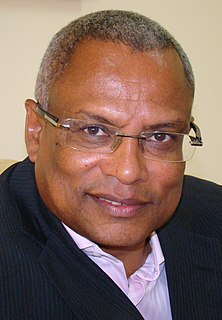
Jorge Fernando Branco de Sampaio was a Portuguese lawyer and politician who was the 18th president of Portugal from 1996 to 2006. A member of the Socialist Party, a party which he led between 1989 and 1992, he was the mayor of Lisbon from 1990 to 1995 and High-Representative for the Alliance of Civilizations between 2007 and 2013.

José Maria Pereira Neves is a Cape Verdean politician who is currently the president of Cape Verde, having previously served as the Prime Minister of Cape Verde from 2001 to 2016. He is a member of the African Party for the Independence of Cape Verde (PAICV). In the 2021 presidential election, he was elected with 51.7% of votes, beating his nearest rival Carlos Veiga who got 42.4% of the total votes.

Pedro Miguel de Santana Lopes GCC is a Portuguese lawyer and politician, who is the current president of the Municipal Chamber of Figueira da Foz. He most notably served as prime minister of Portugal from 2004 to 2005.
Yolanda Morazzo Lopes da Silva was a Cape Verdean language writer as well as a poet.

Baltasar Lopes da Silva was a writer, poet and linguist from Cape Verde, who wrote in both Portuguese and Cape Verdean Creole. With Manuel Lopes and Jorge Barbosa, he was the founder of Claridade. In 1947 he published Chiquinho, considered the greatest Cape Verdean novel and O dialecto crioulo de Cabo Verde which describes different dialects of creoles of Cape Verde. He sometimes wrote under the pseudonym Osvaldo Alcântara.

The 2009 Portuguese legislative election was held on 27 September, to renew all 230 members of the Assembly of the Republic. The Socialist Party, led by incumbent Prime Minister José Sócrates, won the largest number of seats, but didn't repeat the overall majority they gained in 2005.
Orlanda Amarílis Lopes Rodrigues Fernandes Ferreira, known as Orlanda Amarílis was a Cape Verdean writer. She is considered to be a noteworthy writer of fiction whose main literary themes include perspectives on women’s writing, with depictions of various aspects of the lives of Cape Verdean women as well as depictions of the Cape Verdean diaspora. She has been described as "indisputably one of Cape Verde’s most talented writers".

Rui Miguel Marcelino Tavares Pereira, commonly known simply as Rui Tavares, is a Portuguese historian and politician. He has been elected a Member of the Assembly of the Republic in the 2022 legislative election, and has been a member of the Lisbon City Council since 2021.
Domingos Correia Arouca was a Portuguese general, administrator and colonial governor of Cape Verde from 1835 to 1837, he was also a Portuguese politician and freemason.

José Ulisses de Pina Correia e Silva is a Cape Verdean businessman and politician who has been Prime Minister of Cape Verde since 22 April 2016.

Augusto Ernesto dos Santos Silva is a Portuguese sociologist, university professor, and politician who has been the President of the Assembly of the Republic since 2022, in the 15th Legislature. From November 2015 to March 2022, he was the Portuguese Minister of Foreign Affairs, in the XXI and XXII Constitutional Governments led by Prime Minister António Costa.

Fernando Medina Maciel Almeida Correia is a Portuguese economist and politician Socialist Party (PS) who has been serving as Minister of Finance in the government of Prime Minister António Costa since 2022. He previously served as Mayor of Lisbon from 2015, succeeding Costa, to 2021.

Linha de Cintura, originally called Linha de Circumvalação de Lisboa, is a railway line in Lisbon, Portugal. The half circle route was opened in 1888 and connects all radial lines with stations in Lisbon: Cascais, Sul, Sintra/Oeste, and Norte. There are two railway triangles, one in Sete Rios, and another in Xabregas. It crosses all four Lisbon Metro lines, and connects to three of those at four stations.

Local elections in Portugal were held on 26 September 2021. The election consisted of three separate elections in the 308 Portuguese municipalities: the election for the Municipal Chamber, whose winner is elected mayor; another election for the Municipal Assembly ; and an election for the Parish Assembly, whose winner is elected parish president. This last one was held separately in the more than 3,000 parishes around the country.

Guinea-Bissau–Turkey relations are the foreign relations between Guinea-Bissau and Turkey. Turkey has an embassy in Bissau. Guinea Bissau has an embassy in Ankara.

Maria da Graça Amado da Cunha (1919–2001) was a Portuguese classical pianist, best known for interpreting the works of the Portuguese composer Fernando Lopes-Graça. She was a feminist and an opponent of the right-wing Estado Novo regime that governed Portugal between 1933 and 1974.
Helena Roseta is a Portuguese architect, specialising in improvements to poorer neighbourhoods, and a politician who has been a member of the Assembly of the Republic and President of the Assembly of Lisbon Municipality.

Ana Catarina Mendes is a Portuguese politician. As a member of the Portuguese Socialist Party (PS) she has been a deputy in the Portuguese Assembly of the Republic since 1995 and, from 2019, led the party in the National Assembly. In March 2022, she was appointed Minister of Parliamentary Affairs in the XXIII Constitutional Government.
Susana Correia is a Portuguese politician. As a member of the Portuguese Socialist Party (PS), she has been a deputy in the Portuguese Assembly of the Republic since 2019.

Catarina Sarmento e Castro is a Portuguese jurist and politician. As a member of the Portuguese Socialist Party (PS), she became a deputy in the Portuguese Assembly of the Republic in the January 2022 Portuguese legislative election, representing the Leiria District. Between 2019 and 2022 she served as Secretary of State for Human Resources and Former Combatants. A professor in the Faculty of Law at the University of Coimbra, she has also served as a judge in the Constitutional Court. She was appointed Minister of Justice in March 2022, following the 2022 Portuguese legislative election, when the PS won an overall majority.














